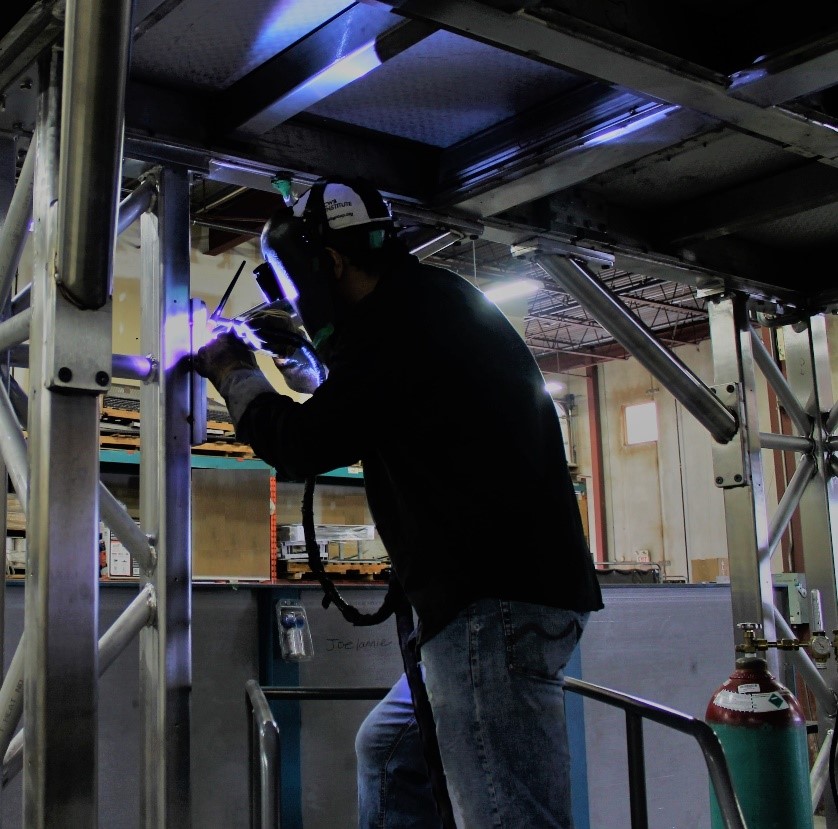The Ultimate Handbook on Custom-made Steel Construction Solutions for Structural Projects
In the world of structural projects, the significance of personalized steel construction remedies can not be overstated. From the foundational understanding of steel fabrication fundamentals to the intricate procedure of picking the most appropriate products, every step in this journey plays a pivotal role in the supreme success of a job.
Understanding Custom-made Steel Construction Essentials
Diving right into the basics of personalized steel fabrication provides understanding right into the complex procedure of transforming raw steel right into tailored architectural elements. Customized steel construction is a customized manufacturing method that entails cutting, shaping, and assembling steel materials to produce special frameworks according to specific task needs. Understanding the essentials of personalized steel manufacture is critical for guaranteeing the successful execution of architectural jobs.
The process usually begins with the assessment of task requirements and layout demands. This preliminary stage involves thorough preparation and partnership between designers, producers, and engineers to establish one of the most ideal method for making the steel elements. Precision is essential throughout the construction procedure, as also small deviations can influence the structural integrity of the end product.
Numerous techniques, such as reducing, welding, and shaping, are used to transform raw steel into the preferred structural components. Skilled fabricators utilize advanced equipment and tools to make certain accuracy and consistency throughout the manufacture process. Quality assurance measures are applied to verify the honesty of the produced components before they are constructed on-site, ensuring compliance with market standards and task specs.
Picking the Right Steel Materials

First and primary, the kind of structural task and its particular requirements play an important function in figuring out the most ideal steel materials. Variables such as the load-bearing capability, environmental problems, and preferred life expectancy of the framework will determine the quality and sort of steel that need to be utilized.
Furthermore, the physical buildings of the steel, consisting of ductility, weldability, and stamina, have to straighten with the project's requirements to assure ideal performance and longevity (steel fixing). Furthermore, considerations such as corrosion resistance, cost-effectiveness, and availability of the steel materials should likewise be considered during the choice process
Design Factors To Consider for Architectural Projects
Architectural jobs demand precise interest to design factors to consider to ensure both capability and safety and security are prioritized throughout the building and construction process. When it comes to making structural projects, several essential elements should be taken right into account to guarantee the success of the venture. By thoroughly thinking about these aspects throughout the design phase, designers and engineers can guarantee the architectural project's success from perception to conclusion.
Enhancing Manufacture Procedures for Efficiency

In addition, carrying out lean manufacturing concepts can dramatically enhance efficiency in steel construction. By reducing waste, optimizing operations, and improving interaction between various teams associated with the manufacture process, projects can be finished extra quickly and with better standards.
Additionally, developing a well-organized manufacturing routine and operations can assist in focusing on jobs, appointing resources successfully, and conference task target dates quickly. By having a clear plan in read this position and frequently checking progression, any prospective bottlenecks or delays can be determined and addressed promptly, making certain efficient and smooth construction procedures for architectural jobs.
Quality Assurance and Job Management in Steel Construction
To make certain the effective implementation of steel manufacture jobs, meticulous high quality control procedures and efficient project administration practices are vital parts in keeping precision and meeting customer expectations. Quality control in steel construction entails rigorous examinations at various phases of the fabrication process to validate compliance with job requirements and market requirements. This consists of material testing, dimensional checks, and weld evaluations to make sure structural honesty and safety and security.
Task administration plays an essential role in collaborating the different facets of steel fabrication tasks, such as organizing, source allocation, and interaction among group participants. A distinct job plan with clear objectives, milestones, and timelines helps to check progression and address any potential issues proactively. Reliable communication in between all stakeholders, including clients, engineers, fabricators, and professionals, is vital for ensuring that go the task proceeds smoothly and fulfills the preferred top quality standards.
Final Thought
Finally, custom steel manufacture plays an important function in architectural jobs by providing tailored services making use of the right materials and style considerations. Performance in construction procedures, quality assurance, and reliable project management are necessary for successful results. By recognizing the fundamentals of customized steel construction and carrying out streamlined procedures, job groups can provide top quality and sturdy frameworks that meet the certain demands of their customers.
Customized steel fabrication is a specific production technique that includes cutting, shaping, and assembling steel products to develop one-of-a-kind structures according to certain task demands.To ensure the effective implementation of steel construction jobs, careful high quality control actions and effective task monitoring practices are necessary components in maintaining accuracy and conference client expectations. Quality control in steel manufacture includes extensive evaluations at numerous phases of the manufacture process to validate compliance with project specs and market standards (Alpha reo).Task management plays a critical function in collaborating the various aspects of steel manufacture projects, such as scheduling, source allocation, and interaction among group members.In final thought, custom steel manufacture plays an important role in architectural tasks by offering tailored solutions making use of the appropriate materials and design considerations